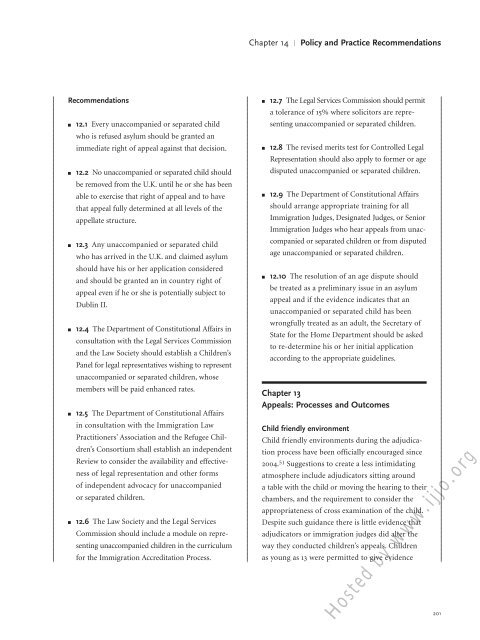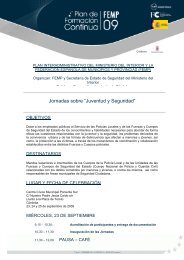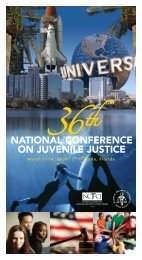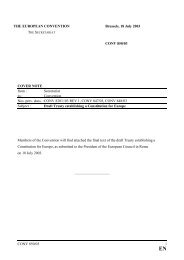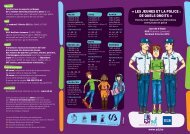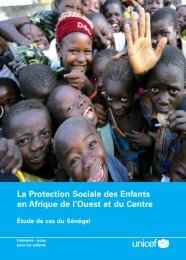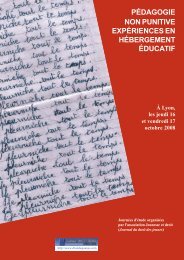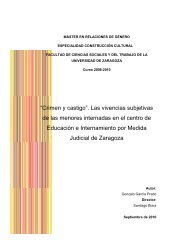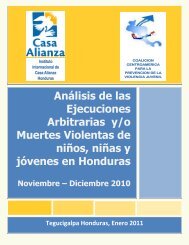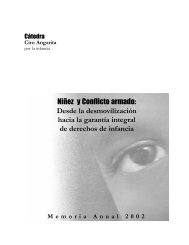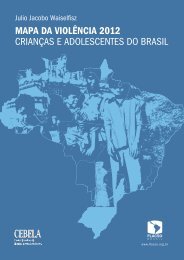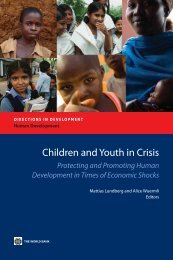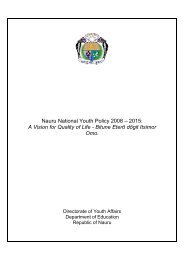Hosted by www.ijjo.org
Hosted by www.ijjo.org
Hosted by www.ijjo.org
You also want an ePaper? Increase the reach of your titles
YUMPU automatically turns print PDFs into web optimized ePapers that Google loves.
Chapter 14 | Policy and Practice Recommendations<br />
Recommendations<br />
■<br />
■<br />
■<br />
■<br />
■<br />
■<br />
12.1 Every unaccompanied or separated child<br />
who is refused asylum should be granted an<br />
immediate right of appeal against that decision.<br />
12.2 No unaccompanied or separated child should<br />
be removed from the U.K. until he or she has been<br />
able to exercise that right of appeal and to have<br />
that appeal fully determined at all levels of the<br />
appellate structure.<br />
12.3 Any unaccompanied or separated child<br />
who has arrived in the U.K. and claimed asylum<br />
should have his or her application considered<br />
and should be granted an in country right of<br />
appeal even if he or she is potentially subject to<br />
Dublin II.<br />
12.4 The Department of Constitutional Affairs in<br />
consultation with the Legal Services Commission<br />
and the Law Society should establish a Children’s<br />
Panel for legal representatives wishing to represent<br />
unaccompanied or separated children, whose<br />
members will be paid enhanced rates.<br />
12.5 The Department of Constitutional Affairs<br />
in consultation with the Immigration Law<br />
Practitioners’ Association and the Refugee Children’s<br />
Consortium shall establish an independent<br />
Review to consider the availability and effectiveness<br />
of legal representation and other forms<br />
of independent advocacy for unaccompanied<br />
or separated children.<br />
12.6 The Law Society and the Legal Services<br />
Commission should include a module on representing<br />
unaccompanied children in the curriculum<br />
for the Immigration Accreditation Process.<br />
■<br />
■<br />
■<br />
■<br />
12.7 The Legal Services Commission should permit<br />
a tolerance of 15% where solicitors are representing<br />
unaccompanied or separated children.<br />
12.8 The revised merits test for Controlled Legal<br />
Representation should also apply to former or age<br />
disputed unaccompanied or separated children.<br />
12.9 The Department of Constitutional Affairs<br />
should arrange appropriate training for all<br />
Immigration Judges, Designated Judges, or Senior<br />
Immigration Judges who hear appeals from unaccompanied<br />
or separated children or from disputed<br />
age unaccompanied or separated children.<br />
12.10 The resolution of an age dispute should<br />
be treated as a preliminary issue in an asylum<br />
appeal and if the evidence indicates that an<br />
unaccompanied or separated child has been<br />
wrongfully treated as an adult, the Secretary of<br />
State for the Home Department should be asked<br />
to re-determine his or her initial application<br />
according to the appropriate guidelines.<br />
Chapter 13<br />
Appeals: Processes and Outcomes<br />
Child friendly environment<br />
Child friendly environments during the adjudication<br />
process have been officially encouraged since<br />
2004. 51 Suggestions to create a less intimidating<br />
atmosphere include adjudicators sitting around<br />
a table with the child or moving the hearing to their<br />
chambers, and the requirement to consider the<br />
appropriateness of cross examination of the child.<br />
Despite such guidance there is little evidence that<br />
adjudicators or immigration judges did alter the<br />
way they conducted children’s appeals. Children<br />
as young as 13 were permitted to give evidence<br />
<strong>Hosted</strong> <strong>by</strong> <strong>www</strong>.<strong>ijjo</strong>.<strong>org</strong><br />
201


